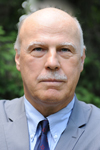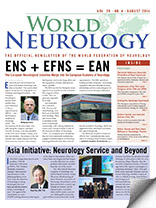By Wolfgang Grisold
The Sixth Regional Teaching Course (RTC) of the EAN took place in June in Lusaka, Zambia. There were 124 participants from 20 Sub-Saharan countries in attendance.
The course, which was organized by the EAN, was supported by a consortium of European and international scientific societies also by the WFN.
- American Academy of Neurology (AAN)
- Epilepsy Association of Zambia
- International Brain Research Organization (IBRO)
- International Parkinson and Movement Disorder Society (MDS)
- Pan African Association of Neuroscience Societies (PAANS)
- University of Zambia
- World Federation of Neurology (WFN)
- World Stroke Organization (WSO)
- Zambian Ministry of Health
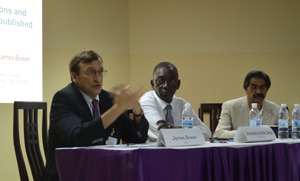 An unrestricted educational grant was obtained from the Lundbeck International Neuroscience Foundation. The course faculty of international educators included: Erich Schmutzhard and Wolfgang Grisold (Austria); Riadh Gouider (Tunisia); William Howlett (Tanzania); Jean-Michel Vallat (France); Anthony Zimba and Masharip Atadzhanov (Zambia); Raj Kalaria, Peter Sandercock and Tim Steiner (UK); Amadou Gallo Diop (Senegal); Angelo Antonini (Italy); James Bower (U.S.); Osheik Seidi (Sudan); and Mehila Zebeginus (Ethiopia).
An unrestricted educational grant was obtained from the Lundbeck International Neuroscience Foundation. The course faculty of international educators included: Erich Schmutzhard and Wolfgang Grisold (Austria); Riadh Gouider (Tunisia); William Howlett (Tanzania); Jean-Michel Vallat (France); Anthony Zimba and Masharip Atadzhanov (Zambia); Raj Kalaria, Peter Sandercock and Tim Steiner (UK); Amadou Gallo Diop (Senegal); Angelo Antonini (Italy); James Bower (U.S.); Osheik Seidi (Sudan); and Mehila Zebeginus (Ethiopia).
This three-day RTC covered infection and nervous system disorders, including stroke and movement disorders and disorders of the peripheral nervous system.
The topics were relevant and up to date. In addition to the teaching aspects, all of the visiting professors emphasized how the latest developments and ideas involved in the diseases under discussion could be implemented.
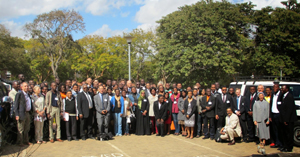 The program was selected by participants from the previous year, based on a poll. The lectures were presented with PowerPoints. Some sessions were supported by video demonstrations. All presentations were followed by discussions, and there was time for questions after each main lecture session. At the end of each block, a question-and-answer session was allowed, which was highly interactive. The faculty joined in guessing the answers and in the discussions, and several academic points of view were aired.
The program was selected by participants from the previous year, based on a poll. The lectures were presented with PowerPoints. Some sessions were supported by video demonstrations. All presentations were followed by discussions, and there was time for questions after each main lecture session. At the end of each block, a question-and-answer session was allowed, which was highly interactive. The faculty joined in guessing the answers and in the discussions, and several academic points of view were aired.
In the afternoon teaching sessions, a pair of lecturers demonstrated cases and encouraged participants to be actively involved in breakout sessions. These cases were either based on video demonstrations, images or classic narrative case descriptions. Participants were asked for their opinions. In some instances, an emphasis on a structural approach was studiously followed. This proved to be interesting, and the teaching sessions were highly informative. In addition, the participants were exposed to the different teaching styles of the faculty depending on the school of teaching (U.K., France, Italy, U.S.) or personal styles.
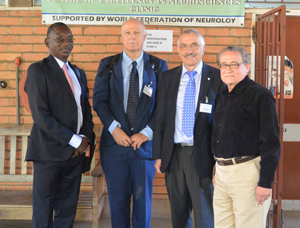 Both the case discussions as well as the general discussions revealed positive and critical aspects: It seems that young neurologists are exposed to a huge quantity of diseases and patient needs in their countries, but they have limited resources in so many ways. But their knowledge and interest is great, and this is what makes this course exciting.
Both the case discussions as well as the general discussions revealed positive and critical aspects: It seems that young neurologists are exposed to a huge quantity of diseases and patient needs in their countries, but they have limited resources in so many ways. But their knowledge and interest is great, and this is what makes this course exciting.
Also, as a critical remark, their sometimes limited knowledge of English can be noted, and there is often some hesitancy to express their opinions in discussions with the teaching professors. Notably, however, the interaction between residents and faculty improved considerably during the course.
Some selected lectures were given by young neurologists, which were technically well prepared, and discussed with the audience.
A special experience was the session on “How to Write Paper.” Three experienced teachers — Dr. Gallo (Senegal), Dr. Kalaria (UK) and Dr. Bowers (US) — each gave a presentation and discussed many aspects, from the selection of a topic, the preparation, technical aspects of the manuscript and how to deal with journal editors and reviewers.
Social Interaction
There was an official reception on Thursday, which was attended by the First Lady of the State Christine Kaseba-Sata, Goodwill Ambassador to WHO, who gave the meeting an official standing. This cannot be estimated highly enough in a country with 40 million inhabitants and only one neurologist. This meeting also was covered by local news and TV, which will likely increase the awareness of neurology in Zambia.
Lunch and coffee breaks were used eagerly for information and exchange.
Local Society of Neurology and Psychiatry
The local neurology department is based on the work of Anthony Zimba and Masharip Atadzhanov. The department in Lusaka contains a WFN-sponsored neurological institute, which now has established EEG and EMG. The university has one MRI and laboratory investigation also offering PCR techniques for neuro-infectious diseases.
Impression
This sixth course seems like a big effort to make, demanding a lot of resources for a small group of attendees in relation to the large number of countries without neurology services. However, all of the attendees are devotedly involved in neurology and are important proponents for neurology.
Furthermore, this course can be considered the ignition or spark for newly developing neurological societies, units and neurologists. The fuel is the knowledge of the importance of neurology and education, which will drive the development in individual countries. An example is Ethiopia, which has profited from the first TC and which has since produced a training program.
WFN’s role is to keep up this spirit of teaching, and encourage and partner with other organizations to improve this momentum of teaching, learning and creating neurology in Africa.
To meet this continuing need, the EAN-led planning group met in Lusaka to plan the next course. The participants were asked to list three topics of interest they would like to see addressed in a future RTC. From the compilation of the suggested topics, two that had the highest number of requests were identified for the 2015 RTC. The seventh RTC will be held in October 2014 in Khartoum, Sudan, and will be hosted by Prof. Osheik Seidi and the University of Khartoum. The themes of the conference will be neuro-pediatrics and stroke.
Grisold is with the Department of Neurology, Kaiser Franz Josef Hospital, Vienna, Austria.
